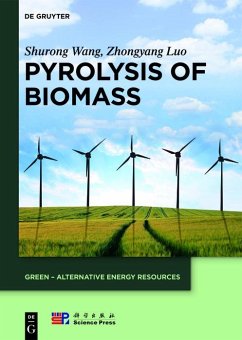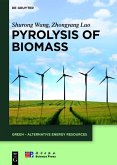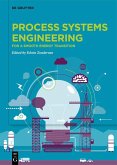90,95 €
90,95 €
inkl. MwSt.
Sofort per Download lieferbar

45 °P sammeln
90,95 €
Als Download kaufen

90,95 €
inkl. MwSt.
Sofort per Download lieferbar

45 °P sammeln
Jetzt verschenken
Alle Infos zum eBook verschenken
90,95 €
inkl. MwSt.
Sofort per Download lieferbar
Alle Infos zum eBook verschenken

45 °P sammeln
- Format: ePub
- Merkliste
- Auf die Merkliste
- Bewerten Bewerten
- Teilen
- Produkt teilen
- Produkterinnerung
- Produkterinnerung

Bitte loggen Sie sich zunächst in Ihr Kundenkonto ein oder registrieren Sie sich bei
bücher.de, um das eBook-Abo tolino select nutzen zu können.
Hier können Sie sich einloggen
Hier können Sie sich einloggen
Sie sind bereits eingeloggt. Klicken Sie auf 2. tolino select Abo, um fortzufahren.

Bitte loggen Sie sich zunächst in Ihr Kundenkonto ein oder registrieren Sie sich bei bücher.de, um das eBook-Abo tolino select nutzen zu können.
With the development of societies fossil energy is no longer the only energy resource, and increasing attention had been paid to alternative energy. Biomass is considered to be one of the alternatives due to efficiency and low cost. This book presents biomass pyrolysis behavior for three main components: Cellulose, Hemicellulose and Lignin, and discusses the influence of mineral salts , zeolite catalysts and metal oxide on their pyrolysis.
- Geräte: eReader
- mit Kopierschutz
- eBook Hilfe
- Größe: 19.72MB
Andere Kunden interessierten sich auch für
![Pyrolysis of Biomass (eBook, PDF) Pyrolysis of Biomass (eBook, PDF)]() Shurong WangPyrolysis of Biomass (eBook, PDF)90,95 €
Shurong WangPyrolysis of Biomass (eBook, PDF)90,95 €![Chemistry and Energy (eBook, ePUB) Chemistry and Energy (eBook, ePUB)]() Mark Anthony BenvenutoChemistry and Energy (eBook, ePUB)40,95 €
Mark Anthony BenvenutoChemistry and Energy (eBook, ePUB)40,95 €![Process Engineering (eBook, ePUB) Process Engineering (eBook, ePUB)]() Michael KleiberProcess Engineering (eBook, ePUB)70,95 €
Michael KleiberProcess Engineering (eBook, ePUB)70,95 €![Dye-sensitized Solar Cells (eBook, ePUB) Dye-sensitized Solar Cells (eBook, ePUB)]() Dye-sensitized Solar Cells (eBook, ePUB)97,95 €
Dye-sensitized Solar Cells (eBook, ePUB)97,95 €![Chemical Reaction Engineering (eBook, ePUB) Chemical Reaction Engineering (eBook, ePUB)]() Tapio SalmiChemical Reaction Engineering (eBook, ePUB)59,95 €
Tapio SalmiChemical Reaction Engineering (eBook, ePUB)59,95 €![Process Systems Engineering (eBook, ePUB) Process Systems Engineering (eBook, ePUB)]() Process Systems Engineering (eBook, ePUB)108,95 €
Process Systems Engineering (eBook, ePUB)108,95 €![Solar Photovoltaic Power Generation (eBook, ePUB) Solar Photovoltaic Power Generation (eBook, ePUB)]() Jinhuan YangSolar Photovoltaic Power Generation (eBook, ePUB)59,95 €
Jinhuan YangSolar Photovoltaic Power Generation (eBook, ePUB)59,95 €-
-
-
With the development of societies fossil energy is no longer the only energy resource, and increasing attention had been paid to alternative energy. Biomass is considered to be one of the alternatives due to efficiency and low cost. This book presents biomass pyrolysis behavior for three main components: Cellulose, Hemicellulose and Lignin, and discusses the influence of mineral salts , zeolite catalysts and metal oxide on their pyrolysis.
Dieser Download kann aus rechtlichen Gründen nur mit Rechnungsadresse in A, B, BG, CY, CZ, D, DK, EW, E, FIN, F, GR, HR, H, IRL, I, LT, L, LR, M, NL, PL, P, R, S, SLO, SK ausgeliefert werden.
Produktdetails
- Produktdetails
- Verlag: de Gruyter Oldenbourg
- Seitenzahl: 268
- Erscheinungstermin: 5. Dezember 2016
- Englisch
- ISBN-13: 9783110386127
- Artikelnr.: 47518312
- Verlag: de Gruyter Oldenbourg
- Seitenzahl: 268
- Erscheinungstermin: 5. Dezember 2016
- Englisch
- ISBN-13: 9783110386127
- Artikelnr.: 47518312
Shurong Wang, Zhongyang Luo, Zhejiang University, Hangzhou, China
Chapter 1 Biomass components and their characteristics
1.1 Biomass components
1.1.1 Ultimate and proximate analysis
1.1.2 Components composition
1.2 Cellulose
1.2.1 Structure characteristics of cellulose
1.2.2 Physico-chemical properties of cellulose
1.2.3 Cellulose model compounds and the isolation of cellulose
1.3 Hemicellulose
1.3.1 Structure characteristics of hemicellulose
1.3.2 Physico-chemical properties of hemicellulose
1.3.3 Hemicellulose model compounds and the isolation of hemicellulose
1.4 Lignin
1.4.1 Structure characteristics of lignin
1.4.2 Physico-chemical properties of lignin
1.4.3 Lignin model compounds and the isolation of lignin
1.5 Extractive
1.6 Mineral Salt
1.6.1 Compositions of mineral salts
1.6.2 Leaching of mineral salts
1.7 Moisture in raw biomass
Reference
Chapter 2 Pyrolysis of cellulose
2.1 Process of cellulose pyrolysis
2.1.1 Overview of cellulose pyrolysis
2.1.2 Pyrolysis of cellulose model compounds
2.2 Effects of different parameters on the pyrolysis behavior of cellulose
2.2.1 Effects of temperature
2.2.2 Effects of residence time
2.2.3 Effects of acid pretreatment
2.2.4 Effects of other parameters
2.3 Kinetic models for cellulose pyrolysis
2.3.1 Single step model
2.3.2 Two step model
2.3.3 Multi-step model
2.4 Active cellulose
2.4.1 The acquisition and characterization of active cellulose
2.4.2 Effects of different parameters on the characteristics of active cellulose
2.5 Mechanism of cellulose pyrolysis based on product formation
2.5.1 Formation mechanism of levoglucosan
2.5.2 Formation mechanism of 5-hydroxymethl furfural
2.5.3 Formation mechanism of glycolaldehyde and 1-hydroxy-2-propanone
2.5.4 Formation mechanism of small molecular gases
2.6 Application of computational chemistry in the study of mechanism of cellulose pyrolysis
2.6.1 Simulation of cellulose monomer pyrolysis
2.6.2 Simulation of cellobiose and cellotriose pyrolysis
2.6.3 Simulation of periodically structural cellulose pyrolysis
Reference
Attached list
Chapter 3 Pyrolysis of hemicellulose
3.1 Process of hemicellulose pyrolysis
3.1.1 Pyrolysis of monosaccharides
3.1.2 Pyrolysis of xylan and other glycan
3.1.3 Pyrolysis of isolated hemicelluloses
3.1.4 Comparison of the pyrolysis of xylan and hemicellulose monosaccharides
3.2 Effects of different parameters on the pyrolysis behavior of hemicellulose
3.2.1 Effect of temperature
3.2.2 Effect of residence time
3.2.3 Effects of other parameters
3.3 Mechanism of hemicelluloses pyrolysis
3.3.1 Kinetic models for hemicellulose pyrolysis
3.3.2 Mechanism of hemicellulose pyrolysis based on products formation
3.3.3 Mechanism of hemicellulose pyrolysis at the molecular level
Reference
Attached list
Chapter 4 Pyrolysis of lignin
4.1 Process of lignin pyrolysis
4.1.1 Introduction of lignin pyrolysis
4.1.2 Pyrolysis of lignin model compounds with typical functional groups
4.1.3 Pyrolysis of various lignin
4.2 Effects of different parameters on the pyrolysis behavior of lignin
4.2.1 Effect of temperature
4.2.2 Effect of residence time
4.2.3 Effects of other parameters
4.3 Mechanism of lignin pyrolysis
4.3.1 Kinetic models for lignin pyrolysis
4.3.2 Mechanism of lignin pyrolysis based on products formation
4.3.3 Mechanism of lignin pyrolysis at the molecular level
Reference
Attached list
Chapter 5 Interactions of biomass components during pyrolysis
5.1 Interaction of different biomass components
5.1.1 Interaction of cellulose and hemicellulose
5.1.1 Interaction of cellulose and lignin
5.1.1 Interaction of hemicellulose and lignin
5.2 Pyrolysis of three-component mixtures
5.2.1 Thermal weight loss behavior of different three-component mixtures
5.2.2 Products distribution from pyrolysis of different three-component mixtures
5.3 Pyrolysis of detergent fibers
5.3.1 Pyrolysis behavior of different detergent fibers
5.3.2 Products distribution from pyrolysis of different detergent fibers
5.4 Influence of extractives on biomass pyrolysis
5.4.1 Pyrolysis behavior of extractives
5.4.2 Influence of the extractives on biomass pyrolysis
Reference
Attached list
Chapter 6 Selective pyrolysis of biomass components
6.1 Influence of mineral salts on the pyrolysis of biomass components
6.1.1 Influence of mineral salts on the pyrolysis kinetics of biomass components
6.1.2 Influence of mineral salts on the cellulose pyrolytic products distribution
6.2 Influence of zeolite catalysts on pyrolysis of biomass components
6.2.1 The characteristics and classification of zeolite catalyst
6.2.2 Influence of microporous zeolites on the pyrolysis of biomass components
6.2.3 Influence of mesoporous zeolites on the pyrolysis of biomass components
6.3 Influence of metal oxide on the pyrolysis of biomass components
6.3.1 Structural characteristics of metal oxide
6.3.2 Influence of metal oxide on the pyrolysis of biomass components
Reference
Attached list
Chapter 7 Pyrolysis of biomass
7.1 Overview of biomass pyrolysis
7.2 Pyrolysis of different species of biomass
7.2.1 Pyrolysis of forestry biomass
7.2.2 Pyrolysis of agricultural biomass
7.2.3 Pyrolysis of herbaceous biomass
7.2.4 Pyrolysis of aquatic biomass
7.2.5 Products distribution from pyrolysis of different species of biomass
7.3 Biomass fast pyrolysis liquefaction
7.3.1 Primary process of biomass fast pyrolysis liquefaction
7.3.2 Effects of different parameters on biomass fast pyrolysis liquefaction
7.4 Bio-oil graded catalytic upgrading
7.4.1 High-efficiency separation by molecular distillation
7.4.2 Upgrading of bio-oil molecular distilled fractions
Reference
1.1 Biomass components
1.1.1 Ultimate and proximate analysis
1.1.2 Components composition
1.2 Cellulose
1.2.1 Structure characteristics of cellulose
1.2.2 Physico-chemical properties of cellulose
1.2.3 Cellulose model compounds and the isolation of cellulose
1.3 Hemicellulose
1.3.1 Structure characteristics of hemicellulose
1.3.2 Physico-chemical properties of hemicellulose
1.3.3 Hemicellulose model compounds and the isolation of hemicellulose
1.4 Lignin
1.4.1 Structure characteristics of lignin
1.4.2 Physico-chemical properties of lignin
1.4.3 Lignin model compounds and the isolation of lignin
1.5 Extractive
1.6 Mineral Salt
1.6.1 Compositions of mineral salts
1.6.2 Leaching of mineral salts
1.7 Moisture in raw biomass
Reference
Chapter 2 Pyrolysis of cellulose
2.1 Process of cellulose pyrolysis
2.1.1 Overview of cellulose pyrolysis
2.1.2 Pyrolysis of cellulose model compounds
2.2 Effects of different parameters on the pyrolysis behavior of cellulose
2.2.1 Effects of temperature
2.2.2 Effects of residence time
2.2.3 Effects of acid pretreatment
2.2.4 Effects of other parameters
2.3 Kinetic models for cellulose pyrolysis
2.3.1 Single step model
2.3.2 Two step model
2.3.3 Multi-step model
2.4 Active cellulose
2.4.1 The acquisition and characterization of active cellulose
2.4.2 Effects of different parameters on the characteristics of active cellulose
2.5 Mechanism of cellulose pyrolysis based on product formation
2.5.1 Formation mechanism of levoglucosan
2.5.2 Formation mechanism of 5-hydroxymethl furfural
2.5.3 Formation mechanism of glycolaldehyde and 1-hydroxy-2-propanone
2.5.4 Formation mechanism of small molecular gases
2.6 Application of computational chemistry in the study of mechanism of cellulose pyrolysis
2.6.1 Simulation of cellulose monomer pyrolysis
2.6.2 Simulation of cellobiose and cellotriose pyrolysis
2.6.3 Simulation of periodically structural cellulose pyrolysis
Reference
Attached list
Chapter 3 Pyrolysis of hemicellulose
3.1 Process of hemicellulose pyrolysis
3.1.1 Pyrolysis of monosaccharides
3.1.2 Pyrolysis of xylan and other glycan
3.1.3 Pyrolysis of isolated hemicelluloses
3.1.4 Comparison of the pyrolysis of xylan and hemicellulose monosaccharides
3.2 Effects of different parameters on the pyrolysis behavior of hemicellulose
3.2.1 Effect of temperature
3.2.2 Effect of residence time
3.2.3 Effects of other parameters
3.3 Mechanism of hemicelluloses pyrolysis
3.3.1 Kinetic models for hemicellulose pyrolysis
3.3.2 Mechanism of hemicellulose pyrolysis based on products formation
3.3.3 Mechanism of hemicellulose pyrolysis at the molecular level
Reference
Attached list
Chapter 4 Pyrolysis of lignin
4.1 Process of lignin pyrolysis
4.1.1 Introduction of lignin pyrolysis
4.1.2 Pyrolysis of lignin model compounds with typical functional groups
4.1.3 Pyrolysis of various lignin
4.2 Effects of different parameters on the pyrolysis behavior of lignin
4.2.1 Effect of temperature
4.2.2 Effect of residence time
4.2.3 Effects of other parameters
4.3 Mechanism of lignin pyrolysis
4.3.1 Kinetic models for lignin pyrolysis
4.3.2 Mechanism of lignin pyrolysis based on products formation
4.3.3 Mechanism of lignin pyrolysis at the molecular level
Reference
Attached list
Chapter 5 Interactions of biomass components during pyrolysis
5.1 Interaction of different biomass components
5.1.1 Interaction of cellulose and hemicellulose
5.1.1 Interaction of cellulose and lignin
5.1.1 Interaction of hemicellulose and lignin
5.2 Pyrolysis of three-component mixtures
5.2.1 Thermal weight loss behavior of different three-component mixtures
5.2.2 Products distribution from pyrolysis of different three-component mixtures
5.3 Pyrolysis of detergent fibers
5.3.1 Pyrolysis behavior of different detergent fibers
5.3.2 Products distribution from pyrolysis of different detergent fibers
5.4 Influence of extractives on biomass pyrolysis
5.4.1 Pyrolysis behavior of extractives
5.4.2 Influence of the extractives on biomass pyrolysis
Reference
Attached list
Chapter 6 Selective pyrolysis of biomass components
6.1 Influence of mineral salts on the pyrolysis of biomass components
6.1.1 Influence of mineral salts on the pyrolysis kinetics of biomass components
6.1.2 Influence of mineral salts on the cellulose pyrolytic products distribution
6.2 Influence of zeolite catalysts on pyrolysis of biomass components
6.2.1 The characteristics and classification of zeolite catalyst
6.2.2 Influence of microporous zeolites on the pyrolysis of biomass components
6.2.3 Influence of mesoporous zeolites on the pyrolysis of biomass components
6.3 Influence of metal oxide on the pyrolysis of biomass components
6.3.1 Structural characteristics of metal oxide
6.3.2 Influence of metal oxide on the pyrolysis of biomass components
Reference
Attached list
Chapter 7 Pyrolysis of biomass
7.1 Overview of biomass pyrolysis
7.2 Pyrolysis of different species of biomass
7.2.1 Pyrolysis of forestry biomass
7.2.2 Pyrolysis of agricultural biomass
7.2.3 Pyrolysis of herbaceous biomass
7.2.4 Pyrolysis of aquatic biomass
7.2.5 Products distribution from pyrolysis of different species of biomass
7.3 Biomass fast pyrolysis liquefaction
7.3.1 Primary process of biomass fast pyrolysis liquefaction
7.3.2 Effects of different parameters on biomass fast pyrolysis liquefaction
7.4 Bio-oil graded catalytic upgrading
7.4.1 High-efficiency separation by molecular distillation
7.4.2 Upgrading of bio-oil molecular distilled fractions
Reference
Chapter 1 Biomass components and their characteristics
1.1 Biomass components
1.1.1 Ultimate and proximate analysis
1.1.2 Components composition
1.2 Cellulose
1.2.1 Structure characteristics of cellulose
1.2.2 Physico-chemical properties of cellulose
1.2.3 Cellulose model compounds and the isolation of cellulose
1.3 Hemicellulose
1.3.1 Structure characteristics of hemicellulose
1.3.2 Physico-chemical properties of hemicellulose
1.3.3 Hemicellulose model compounds and the isolation of hemicellulose
1.4 Lignin
1.4.1 Structure characteristics of lignin
1.4.2 Physico-chemical properties of lignin
1.4.3 Lignin model compounds and the isolation of lignin
1.5 Extractive
1.6 Mineral Salt
1.6.1 Compositions of mineral salts
1.6.2 Leaching of mineral salts
1.7 Moisture in raw biomass
Reference
Chapter 2 Pyrolysis of cellulose
2.1 Process of cellulose pyrolysis
2.1.1 Overview of cellulose pyrolysis
2.1.2 Pyrolysis of cellulose model compounds
2.2 Effects of different parameters on the pyrolysis behavior of cellulose
2.2.1 Effects of temperature
2.2.2 Effects of residence time
2.2.3 Effects of acid pretreatment
2.2.4 Effects of other parameters
2.3 Kinetic models for cellulose pyrolysis
2.3.1 Single step model
2.3.2 Two step model
2.3.3 Multi-step model
2.4 Active cellulose
2.4.1 The acquisition and characterization of active cellulose
2.4.2 Effects of different parameters on the characteristics of active cellulose
2.5 Mechanism of cellulose pyrolysis based on product formation
2.5.1 Formation mechanism of levoglucosan
2.5.2 Formation mechanism of 5-hydroxymethl furfural
2.5.3 Formation mechanism of glycolaldehyde and 1-hydroxy-2-propanone
2.5.4 Formation mechanism of small molecular gases
2.6 Application of computational chemistry in the study of mechanism of cellulose pyrolysis
2.6.1 Simulation of cellulose monomer pyrolysis
2.6.2 Simulation of cellobiose and cellotriose pyrolysis
2.6.3 Simulation of periodically structural cellulose pyrolysis
Reference
Attached list
Chapter 3 Pyrolysis of hemicellulose
3.1 Process of hemicellulose pyrolysis
3.1.1 Pyrolysis of monosaccharides
3.1.2 Pyrolysis of xylan and other glycan
3.1.3 Pyrolysis of isolated hemicelluloses
3.1.4 Comparison of the pyrolysis of xylan and hemicellulose monosaccharides
3.2 Effects of different parameters on the pyrolysis behavior of hemicellulose
3.2.1 Effect of temperature
3.2.2 Effect of residence time
3.2.3 Effects of other parameters
3.3 Mechanism of hemicelluloses pyrolysis
3.3.1 Kinetic models for hemicellulose pyrolysis
3.3.2 Mechanism of hemicellulose pyrolysis based on products formation
3.3.3 Mechanism of hemicellulose pyrolysis at the molecular level
Reference
Attached list
Chapter 4 Pyrolysis of lignin
4.1 Process of lignin pyrolysis
4.1.1 Introduction of lignin pyrolysis
4.1.2 Pyrolysis of lignin model compounds with typical functional groups
4.1.3 Pyrolysis of various lignin
4.2 Effects of different parameters on the pyrolysis behavior of lignin
4.2.1 Effect of temperature
4.2.2 Effect of residence time
4.2.3 Effects of other parameters
4.3 Mechanism of lignin pyrolysis
4.3.1 Kinetic models for lignin pyrolysis
4.3.2 Mechanism of lignin pyrolysis based on products formation
4.3.3 Mechanism of lignin pyrolysis at the molecular level
Reference
Attached list
Chapter 5 Interactions of biomass components during pyrolysis
5.1 Interaction of different biomass components
5.1.1 Interaction of cellulose and hemicellulose
5.1.1 Interaction of cellulose and lignin
5.1.1 Interaction of hemicellulose and lignin
5.2 Pyrolysis of three-component mixtures
5.2.1 Thermal weight loss behavior of different three-component mixtures
5.2.2 Products distribution from pyrolysis of different three-component mixtures
5.3 Pyrolysis of detergent fibers
5.3.1 Pyrolysis behavior of different detergent fibers
5.3.2 Products distribution from pyrolysis of different detergent fibers
5.4 Influence of extractives on biomass pyrolysis
5.4.1 Pyrolysis behavior of extractives
5.4.2 Influence of the extractives on biomass pyrolysis
Reference
Attached list
Chapter 6 Selective pyrolysis of biomass components
6.1 Influence of mineral salts on the pyrolysis of biomass components
6.1.1 Influence of mineral salts on the pyrolysis kinetics of biomass components
6.1.2 Influence of mineral salts on the cellulose pyrolytic products distribution
6.2 Influence of zeolite catalysts on pyrolysis of biomass components
6.2.1 The characteristics and classification of zeolite catalyst
6.2.2 Influence of microporous zeolites on the pyrolysis of biomass components
6.2.3 Influence of mesoporous zeolites on the pyrolysis of biomass components
6.3 Influence of metal oxide on the pyrolysis of biomass components
6.3.1 Structural characteristics of metal oxide
6.3.2 Influence of metal oxide on the pyrolysis of biomass components
Reference
Attached list
Chapter 7 Pyrolysis of biomass
7.1 Overview of biomass pyrolysis
7.2 Pyrolysis of different species of biomass
7.2.1 Pyrolysis of forestry biomass
7.2.2 Pyrolysis of agricultural biomass
7.2.3 Pyrolysis of herbaceous biomass
7.2.4 Pyrolysis of aquatic biomass
7.2.5 Products distribution from pyrolysis of different species of biomass
7.3 Biomass fast pyrolysis liquefaction
7.3.1 Primary process of biomass fast pyrolysis liquefaction
7.3.2 Effects of different parameters on biomass fast pyrolysis liquefaction
7.4 Bio-oil graded catalytic upgrading
7.4.1 High-efficiency separation by molecular distillation
7.4.2 Upgrading of bio-oil molecular distilled fractions
Reference
1.1 Biomass components
1.1.1 Ultimate and proximate analysis
1.1.2 Components composition
1.2 Cellulose
1.2.1 Structure characteristics of cellulose
1.2.2 Physico-chemical properties of cellulose
1.2.3 Cellulose model compounds and the isolation of cellulose
1.3 Hemicellulose
1.3.1 Structure characteristics of hemicellulose
1.3.2 Physico-chemical properties of hemicellulose
1.3.3 Hemicellulose model compounds and the isolation of hemicellulose
1.4 Lignin
1.4.1 Structure characteristics of lignin
1.4.2 Physico-chemical properties of lignin
1.4.3 Lignin model compounds and the isolation of lignin
1.5 Extractive
1.6 Mineral Salt
1.6.1 Compositions of mineral salts
1.6.2 Leaching of mineral salts
1.7 Moisture in raw biomass
Reference
Chapter 2 Pyrolysis of cellulose
2.1 Process of cellulose pyrolysis
2.1.1 Overview of cellulose pyrolysis
2.1.2 Pyrolysis of cellulose model compounds
2.2 Effects of different parameters on the pyrolysis behavior of cellulose
2.2.1 Effects of temperature
2.2.2 Effects of residence time
2.2.3 Effects of acid pretreatment
2.2.4 Effects of other parameters
2.3 Kinetic models for cellulose pyrolysis
2.3.1 Single step model
2.3.2 Two step model
2.3.3 Multi-step model
2.4 Active cellulose
2.4.1 The acquisition and characterization of active cellulose
2.4.2 Effects of different parameters on the characteristics of active cellulose
2.5 Mechanism of cellulose pyrolysis based on product formation
2.5.1 Formation mechanism of levoglucosan
2.5.2 Formation mechanism of 5-hydroxymethl furfural
2.5.3 Formation mechanism of glycolaldehyde and 1-hydroxy-2-propanone
2.5.4 Formation mechanism of small molecular gases
2.6 Application of computational chemistry in the study of mechanism of cellulose pyrolysis
2.6.1 Simulation of cellulose monomer pyrolysis
2.6.2 Simulation of cellobiose and cellotriose pyrolysis
2.6.3 Simulation of periodically structural cellulose pyrolysis
Reference
Attached list
Chapter 3 Pyrolysis of hemicellulose
3.1 Process of hemicellulose pyrolysis
3.1.1 Pyrolysis of monosaccharides
3.1.2 Pyrolysis of xylan and other glycan
3.1.3 Pyrolysis of isolated hemicelluloses
3.1.4 Comparison of the pyrolysis of xylan and hemicellulose monosaccharides
3.2 Effects of different parameters on the pyrolysis behavior of hemicellulose
3.2.1 Effect of temperature
3.2.2 Effect of residence time
3.2.3 Effects of other parameters
3.3 Mechanism of hemicelluloses pyrolysis
3.3.1 Kinetic models for hemicellulose pyrolysis
3.3.2 Mechanism of hemicellulose pyrolysis based on products formation
3.3.3 Mechanism of hemicellulose pyrolysis at the molecular level
Reference
Attached list
Chapter 4 Pyrolysis of lignin
4.1 Process of lignin pyrolysis
4.1.1 Introduction of lignin pyrolysis
4.1.2 Pyrolysis of lignin model compounds with typical functional groups
4.1.3 Pyrolysis of various lignin
4.2 Effects of different parameters on the pyrolysis behavior of lignin
4.2.1 Effect of temperature
4.2.2 Effect of residence time
4.2.3 Effects of other parameters
4.3 Mechanism of lignin pyrolysis
4.3.1 Kinetic models for lignin pyrolysis
4.3.2 Mechanism of lignin pyrolysis based on products formation
4.3.3 Mechanism of lignin pyrolysis at the molecular level
Reference
Attached list
Chapter 5 Interactions of biomass components during pyrolysis
5.1 Interaction of different biomass components
5.1.1 Interaction of cellulose and hemicellulose
5.1.1 Interaction of cellulose and lignin
5.1.1 Interaction of hemicellulose and lignin
5.2 Pyrolysis of three-component mixtures
5.2.1 Thermal weight loss behavior of different three-component mixtures
5.2.2 Products distribution from pyrolysis of different three-component mixtures
5.3 Pyrolysis of detergent fibers
5.3.1 Pyrolysis behavior of different detergent fibers
5.3.2 Products distribution from pyrolysis of different detergent fibers
5.4 Influence of extractives on biomass pyrolysis
5.4.1 Pyrolysis behavior of extractives
5.4.2 Influence of the extractives on biomass pyrolysis
Reference
Attached list
Chapter 6 Selective pyrolysis of biomass components
6.1 Influence of mineral salts on the pyrolysis of biomass components
6.1.1 Influence of mineral salts on the pyrolysis kinetics of biomass components
6.1.2 Influence of mineral salts on the cellulose pyrolytic products distribution
6.2 Influence of zeolite catalysts on pyrolysis of biomass components
6.2.1 The characteristics and classification of zeolite catalyst
6.2.2 Influence of microporous zeolites on the pyrolysis of biomass components
6.2.3 Influence of mesoporous zeolites on the pyrolysis of biomass components
6.3 Influence of metal oxide on the pyrolysis of biomass components
6.3.1 Structural characteristics of metal oxide
6.3.2 Influence of metal oxide on the pyrolysis of biomass components
Reference
Attached list
Chapter 7 Pyrolysis of biomass
7.1 Overview of biomass pyrolysis
7.2 Pyrolysis of different species of biomass
7.2.1 Pyrolysis of forestry biomass
7.2.2 Pyrolysis of agricultural biomass
7.2.3 Pyrolysis of herbaceous biomass
7.2.4 Pyrolysis of aquatic biomass
7.2.5 Products distribution from pyrolysis of different species of biomass
7.3 Biomass fast pyrolysis liquefaction
7.3.1 Primary process of biomass fast pyrolysis liquefaction
7.3.2 Effects of different parameters on biomass fast pyrolysis liquefaction
7.4 Bio-oil graded catalytic upgrading
7.4.1 High-efficiency separation by molecular distillation
7.4.2 Upgrading of bio-oil molecular distilled fractions
Reference
"Das Buch eignet sich für alle Leser, die vor allem einen Zugang zum chemischen Geschehen der Pyrolyse von Biomasse erhalten wollen. Darin liegt der besondere Wert dieses Bandes, mit dem er sich gegenüber anderen Monographien auch deutlich absetzt. Dies können sowohl Einsteiger in das Thema sein, aber auch Fachleute, die einen tieferen Einblick in das chemische Reaktionsgeschehen der Pyrolyse von Lignocellulose und ihrer Bestandteile erhalten wollen."
N. Dahmen in: Chem. Ing. Tech. 89 (2017) No. 9, 1255-1256
N. Dahmen in: Chem. Ing. Tech. 89 (2017) No. 9, 1255-1256







